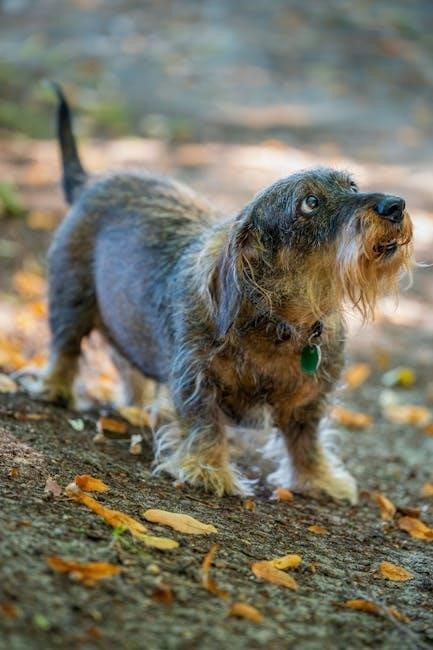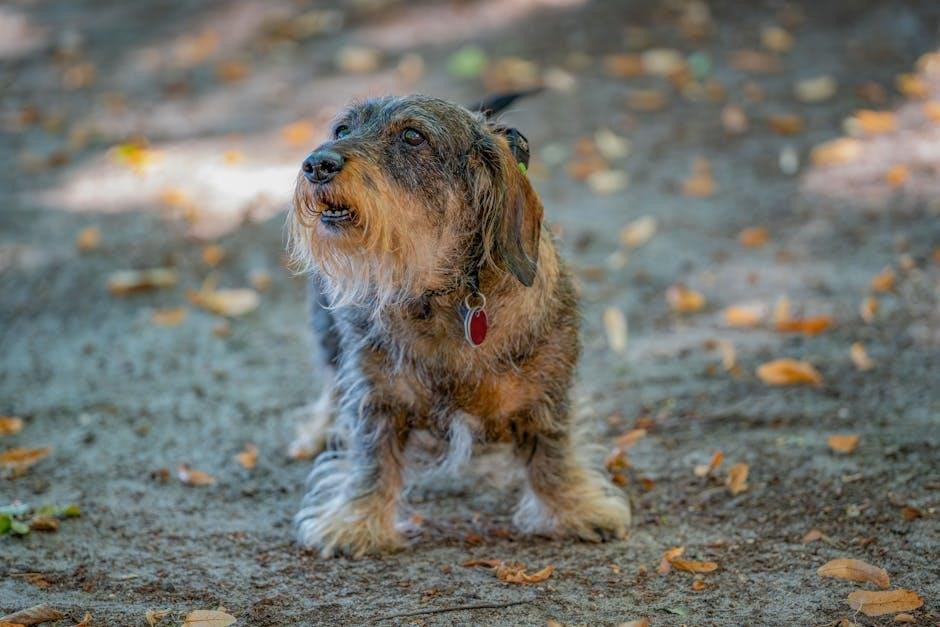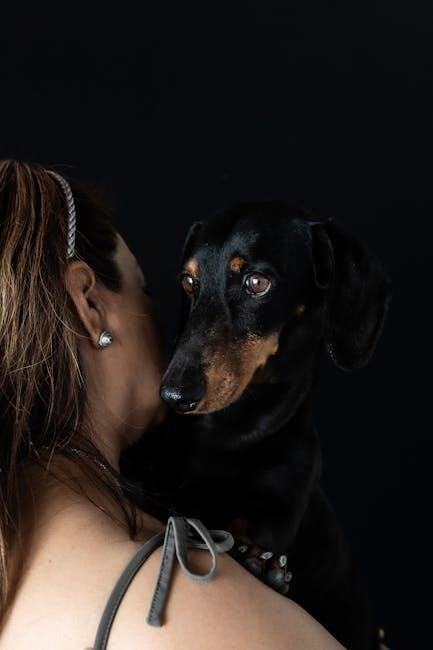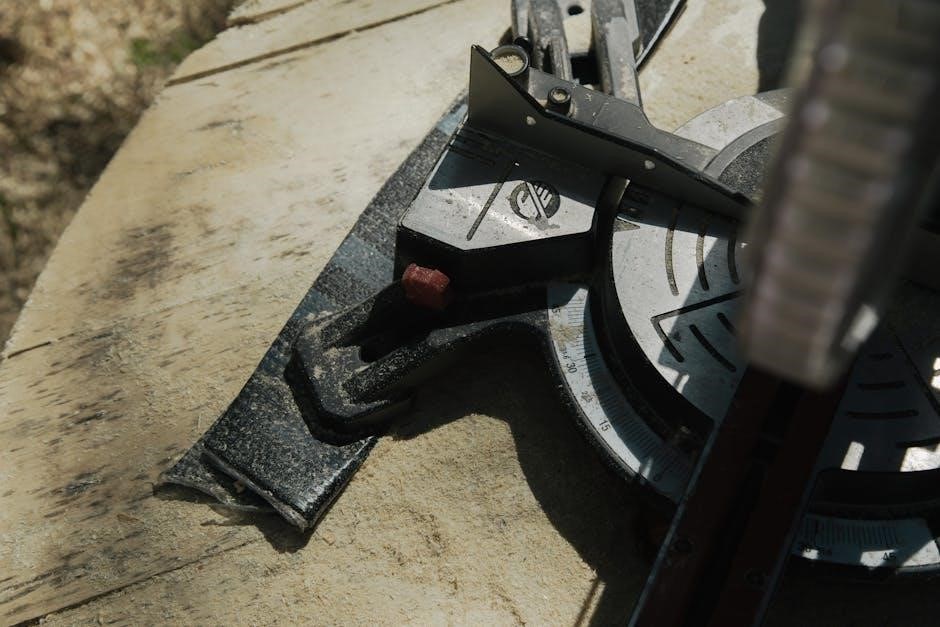
miniature dachshund feeding guide
Miniature Dachshunds, with their unique body structure and spirited nature, require a tailored diet to support their health and energy needs. This guide provides essential insights into creating a balanced and nutritious feeding plan, addressing their specific dietary requirements and common health considerations to ensure a happy and vibrant life.

Nutritional Requirements for Miniature Dachshunds
Miniature Dachshunds require a balanced diet rich in high-quality protein, complex carbs, and healthy fats to support energy, digestion, and overall health. Consulting a vet ensures all needs are met.
2.1. Protein Sources: Chicken, Turkey, Beef, and Fish
High-quality protein is essential for Miniature Dachshunds, supporting muscle maintenance and overall health. Lean sources like chicken, turkey, beef, and fish are ideal, providing essential amino acids while avoiding excess fat. These proteins help maintain energy levels and support the breed’s active lifestyle. Ensuring a varied intake of these proteins can promote a robust immune system and sustain vitality throughout their life.
2.2. Carbohydrates: Brown Rice, Sweet Potatoes, and Vegetables
Carbohydrates are essential for providing energy and supporting digestive health in Miniature Dachshunds. Brown rice, sweet potatoes, and vegetables are excellent sources of complex carbs, offering fiber, vitamins, and minerals. These ingredients aid in maintaining a healthy digestive system and ensuring steady energy levels. Incorporating these whole foods into their diet promotes overall vitality and supports their active, spirited nature without contributing to excessive weight gain.
2.3. Fats and Calories: Fish Oil and Flaxseed
Fats are crucial for maintaining healthy skin, coat, and overall energy in Miniature Dachshunds. Fish oil and flaxseed are excellent sources of omega-3 and omega-6 fatty acids, which support skin health and reduce inflammation. These fats also aid in maintaining a shiny coat and promoting joint health. However, due to the breed’s propensity for obesity, calorie intake must be carefully monitored to ensure a balanced and healthy diet without overfeeding.
2.4. Vitamins and Minerals: Essential for Overall Health
Vitamins and minerals are vital for a Miniature Dachshund’s overall health, supporting immune function, nerve health, and bone strength. Key nutrients include Vitamin E for skin and coat health, and minerals like calcium and phosphorus for strong bones. A balanced diet with whole ingredients ensures adequate levels, but supplements may be necessary in some cases. Always consult a veterinarian to tailor vitamin and mineral intake to your dog’s specific needs and health status.

Feeding Schedule for Miniature Dachshunds
Miniature Dachshunds thrive on a consistent feeding schedule, typically requiring two balanced meals per day. Portion control is crucial to prevent obesity, with adjustments based on age and activity.
3.1. Frequency of Meals: Two Meals Per Day
Feeding your Miniature Dachshund twice daily is recommended to maintain a consistent energy level and prevent overeating. This schedule supports digestion and helps regulate metabolism. Each meal should be appropriately portioned to meet their daily nutritional needs without overfeeding. Adjustments may be necessary based on age, size, and activity level, ensuring a balanced diet that promotes overall health and well-being. Consult a veterinarian to tailor the feeding plan to your dog’s specific requirements.
3.2. Portion Control: 250 Grams or 8-9 Ounces Daily
Miniature Dachshunds should be fed 250 grams or 8-9 ounces of food daily, divided into two meals. This portion ensures they receive adequate nutrition without overeating. Monitoring their weight and adjusting portions as needed is crucial to prevent obesity. The average calorie intake should be around 330 calories per day for an adult. Consistent portion control helps maintain a healthy weight and supports overall well-being. Always consult a veterinarian for personalized feeding recommendations.
3.3. Adjustments Based on Age and Activity Level
- Puppies may require more frequent, smaller meals to support growth and energy levels.
- Adult Dachshunds need portions adjusted based on activity; active dogs may need more calories, while less active dogs require fewer.
- Senior dogs may need calorie reduction to prevent obesity but should maintain nutrient-rich diets for joint and overall health.
Always consult a veterinarian to tailor portions to your dog’s specific needs and lifestyle.
Health Considerations and Dietary Management
Miniature Dachshunds are prone to obesity, spinal issues, allergies, and digestive problems. Their diet must manage these conditions, ensuring a balance of nutrients while avoiding harmful ingredients.
4.1. Obesity and Weight Management
Obesity is a significant health risk for Miniature Dachshunds, exacerbating spinal issues and joint problems. Monitoring calorie intake and portion sizes is crucial. Feeding a diet low in fats and high in fiber helps maintain a healthy weight. Regular exercise and a balanced diet can prevent obesity, ensuring your Dachshund stays active and healthy. Consult a vet for personalized weight management plans.
4.2. Spinal Health: Omega-3 Fatty Acids and Anti-Inflammatory Ingredients
Miniature Dachshunds are prone to spinal issues like intervertebral disc disease (IVDD). A diet rich in omega-3 fatty acids, glucosamine, and chondroitin supports spinal health by reducing inflammation and strengthening joints. Anti-inflammatory ingredients such as turmeric can also aid in managing spinal discomfort. Ensuring proper nutrition helps mitigate risks and promotes a healthy, pain-free life for your Dachshund.
4.3. Allergies and Skin Issues: Hypoallergenic Diets
Miniature Dachshunds often suffer from allergies and skin issues, which can manifest as irritation or digestive problems. Hypoallergenic diets are essential, focusing on novel protein sources like venison or duck and avoiding common allergens such as beef or dairy. These diets minimize allergic reactions and promote healthier skin. Omega-3 fatty acids also play a role in reducing inflammation and improving coat condition. Consulting a vet to identify allergens and tailor a hypoallergenic diet is crucial for relief and long-term skin health;
4.4. Digestive Health: High-Fiber Foods and Probiotics
Miniature Dachshunds often experience sensitive digestive systems, making high-fiber foods and probiotics essential. Fiber-rich ingredients like brown rice, sweet potatoes, and vegetables aid in digestion, preventing issues like pancreatitis and bloat. Probiotics support gut health, reducing gastrointestinal inflammation and promoting a balanced microbiome. Incorporating these into their diet can alleviate digestive discomfort and enhance overall well-being. Always consult a veterinarian to ensure the best dietary approach for your Dachshund’s specific needs.

Supplements for Miniature Dachshunds
Supplements like glucosamine, chondroitin, and omega-3 fatty acids support joint health and skin condition. Probiotics aid digestion. Consult a vet to determine the best options for your Dachshund.
5.1. Joint Supplements: Glucosamine and Chondroitin
Joint supplements containing glucosamine and chondroitin are essential for Miniature Dachshunds, supporting spinal health and reducing inflammation. These ingredients help maintain joint mobility and alleviate arthritis symptoms. Regular use can prevent degenerative disc disease and improve overall comfort. Always consult a veterinarian before adding any supplements to ensure they complement your dog’s diet and health condition effectively.
5.2; Omega-3 and Omega-6 Fatty Acids for Skin and Coat
Omega-3 and Omega-6 fatty acids are crucial for Miniature Dachshunds’ skin and coat health, reducing itching and inflammation. These fatty acids promote a shiny, healthy coat and alleviate skin allergies. They are often available in treat-like chews, making them easy to administer. Formulated by veterinarians, these supplements are made with high-quality, human-grade ingredients and support overall skin well-being. Regular use can significantly improve your Dachshund’s comfort and appearance, ensuring a vibrant and healthy coat;
5.3. Skin and Coat Supplements: Vitamins and Minerals
Vitamins and minerals play a vital role in maintaining healthy skin and a vibrant coat for Miniature Dachshunds. Supplements rich in Vitamin E and Zinc help combat skin issues like dermatitis and promote a lustrous coat. These nutrients support natural moisture balance and reduce shedding. Consulting a veterinarian ensures the right mix, preventing deficiencies or excess. Proper supplementation enhances skin health and keeps their coat in optimal condition, contributing to overall well-being and aesthetic appeal.
Best Food Options for Miniature Dachshunds
High-quality commercial dog foods, homemade diets, and raw food options are popular choices, each offering unique benefits. Consult a vet to tailor meals to your dog’s needs.
6.1. High-Quality Commercial Dog Foods
High-quality commercial dog foods are a convenient and nutritious option for Miniature Dachshunds; Look for formulas with whole, named protein sources like chicken or turkey, avoiding fillers and by-products. Ensure the food is rich in essential vitamins and minerals, with added supplements like omega-3 fatty acids for skin and joint health. Choose brands that use minimal processing and are manufactured in the USA to adhere to strict safety standards. Always consult your veterinarian to select the best option for your dog’s specific needs.
6.2. Homemade Diets: Balanced and Nutritious Recipes
Homemade diets offer a customizable and nutritious option for Miniature Dachshunds, allowing tailored meals to meet specific needs. Recipes should include high-quality proteins like chicken or fish, paired with complex carbs such as brown rice or sweet potatoes. Incorporate vegetables like carrots and green beans for fiber and vitamins. Essential supplements like fish oil for omega-3s and joint aids should be added. Always formulate recipes in consultation with a veterinary nutritionist to ensure a balanced diet that avoids nutritional deficiencies.
6.3. Raw Food Diets: Benefits and Risks
Raw food diets for Miniature Dachshunds offer potential benefits, such as improved digestion and reduced allergies, due to their high protein content and natural ingredients. However, risks include bacterial contamination from uncooked meats and the potential for nutritional imbalances. A raw diet should only be considered under veterinary guidance to ensure it meets your dog’s needs and avoids harmful pathogens. Proper preparation and balancing are crucial to prevent long-term health issues.

Foods to Avoid Feeding Your Miniature Dachshund
Feeding your Miniature Dachshund requires careful selection to avoid harmful ingredients. Foods containing fillers, by-products, high sodium, and artificial additives should be avoided to prevent health issues.
7.1. Fillers and By-Products
Fillers and by-products are non-nutritive ingredients that can harm your Miniature Dachshund’s health. These often include unspecified animal parts and low-quality grains, which can cause digestive issues and allergies. They provide little to no nutritional value and should be avoided. Opt for dog foods with named protein sources and whole ingredients to ensure your Miniature Dachshund receives a balanced diet. Always consult your veterinarian for tailored dietary advice to maintain your dog’s optimal health.
7.2. High-Sodium Foods
High-sodium foods can lead to health issues in Miniature Dachshunds, including heart disease and hypertension; These foods can strain their cardiovascular system and worsen existing health conditions. It’s crucial to avoid feeding your Miniature Dachshund foods with excessive sodium. Opt for low-sodium, balanced diets to support their heart health and overall well-being. Always consult your veterinarian to ensure your dog’s diet is suitable for their specific needs and health status.
7.3. Artificial Colors, Flavors, and Preservatives
Artificial colors, flavors, and preservatives in dog food can pose health risks for Miniature Dachshunds. These additives may cause allergic reactions, digestive issues, or inflammation. Natural, whole ingredients are preferable to ensure your dog’s diet remains clean and free from harmful chemicals. Always choose foods with minimal processing and no artificial additives to promote long-term health and well-being for your Miniature Dachshund.
FAQs About Miniature Dachshund Feeding
Discover answers to common questions about feeding your Miniature Dachshund, including portion sizes, food types, and addressing specific dietary needs for optimal health and longevity.
8.1. How Much Should I Feed My Miniature Dachshund?
Miniature Dachshunds typically require 250 grams or 8-9 ounces of food daily, divided into two meals. Portion sizes may vary based on age, weight, activity level, and health conditions. Puppies and younger dogs may need more frequent, smaller meals, while adults should be monitored to prevent overfeeding. Consult a veterinarian to tailor feeding amounts to your dog’s specific needs and ensure a healthy weight to avoid obesity and related health issues.
8.2. Wet Food vs. Dry Food: Which is Better?
The choice between wet and dry food for Miniature Dachshunds depends on individual needs. Wet food offers higher moisture content, which can aid hydration and urinary health, and is often more palatable. Dry food, however, supports dental health by reducing tartar buildup and is more convenient for storage. Both options can be nutritionally balanced, so the decision should be based on your dog’s preferences, health conditions, and veterinarian recommendations to ensure the best outcomes.
8.3. Are Grain-Free Diets Suitable for Miniature Dachshunds?
Grain-free diets can be suitable for Miniature Dachshunds if they are well-balanced and meet nutritional needs. However, they should not be chosen solely for the absence of grains unless allergies exist. Consult your vet before switching, as grains provide essential nutrients. Ensure the diet includes high-quality protein sources and avoid fillers to maintain your Dachshund’s health and energy levels effectively.
8.4. What Foods Are Toxic to Miniature Dachshunds?
Certain foods are toxic to Miniature Dachshunds and must be avoided. Chocolate, grapes, raisins, onions, garlic, and caffeine contain compounds harmful to dogs. Xylitol, found in sugar-free products, is also dangerous. These foods can cause severe health issues, including organ failure. Always keep such items out of reach and consult your vet immediately if ingestion occurs to ensure prompt treatment and prevent complications for your pet’s safety and well-being.
Providing a balanced and nutritious diet is crucial for the health and well-being of your Miniature Dachshund. By understanding their specific nutritional needs, managing portion sizes, and avoiding harmful foods, you can help prevent common health issues. Regular vet consultations ensure personalized care. With proper nutrition and attention, your Miniature Dachshund can thrive, enjoying a happy and active life as a beloved companion.
Related Posts

light bulb color temperature guide
Warm or cool? Discover the ideal light bulb color temperature for *every* room! Our guide makes choosing easy & creates the vibe you want. ✨

circular saw blade teeth guide
Learn how to choose, maintain, and sharpen your circular saw blade teeth with our expert guide. Improve your cutting performance today!

ap bio unit 7 study guide
Ace your AP Biology Unit 7 exam with our detailed study guide! Get comprehensive review notes, key concepts, and expert tips to succeed.